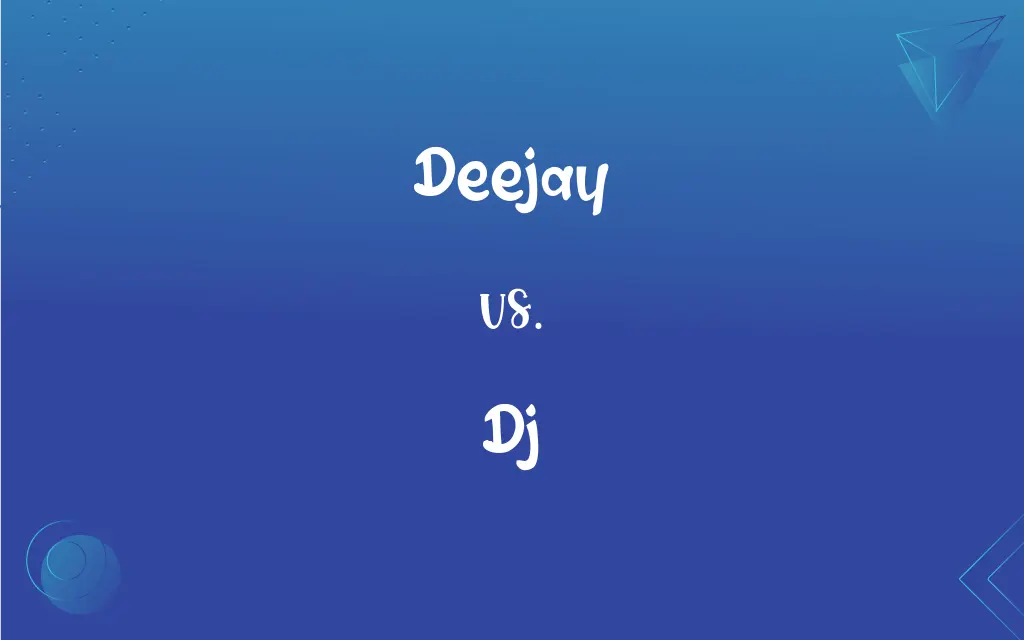Deejay vs. Dj: What's the Difference?
By Janet White & Aimie Carlson || Updated on May 21, 2024
Deejay is an extended form of DJ, both referring to a person who plays recorded music for an audience. Deejay emphasizes the phonetic spelling, while DJ is the standard abbreviation.

Key Differences
Deejay and DJ both refer to individuals who play recorded music for audiences at various events. Deejay is an alternative spelling that emphasizes the phonetic pronunciation, providing a more stylized or informal appearance. DJ, on the other hand, is the widely accepted abbreviation derived from "disc jockey."
Deejay is often used to convey a sense of personality or brand, making it popular among performers who want a unique identity. DJ is more commonly used in professional and formal contexts, such as promotional materials or media references.
The term deejay can also evoke a sense of nostalgia or a connection to the early days of radio broadcasting. In contrast, DJ is modern and concise, fitting well in digital media and contemporary branding.
Both terms, deejay and DJ, are interchangeable in casual conversation, but DJ is preferred in written form due to its brevity and recognizability. Deejay might be used to stand out or emphasize the artistic aspect of the role.
Comparison Chart
Spelling
Extended, phonetic
Abbreviated
ADVERTISEMENT
Common Usage
Stylized, informal
Standard, formal
Professional Use
Less common
More common
Branding
Emphasizes personality
Modern, concise
Historical Connotation
Nostalgic, early radio
Contemporary
Deejay and Dj Definitions
Deejay
A term emphasizing the creative aspect of being a DJ.
As a deejay, he’s known for his unique remixes.
ADVERTISEMENT
Dj
Short for "disc jockey."
The DJ's set was the highlight of the festival.
Deejay
A person who plays recorded music for an audience.
The deejay kept the party lively with upbeat tracks.
Dj
A professional music mixer at events and clubs.
The DJ mixed the beats perfectly to match the crowd's energy.
Deejay
Someone who mixes tracks live at an event.
The deejay skillfully blended different genres.
Dj
A person who plays recorded music for audiences.
The DJ was spinning tracks all night long.
Deejay
A radio broadcaster who plays and discusses music.
The deejay introduced the next song with enthusiasm.
Dj
Someone who curates and plays music on the radio.
The DJ announced the next track on the air.
Deejay
An informal or stylized spelling of DJ.
She hired a famous deejay for her wedding.
Dj
A modern and widely accepted term for a music performer.
The DJ's popularity has soared in recent years.
Deejay
A disc jockey.
Dj
A disc jockey.
Deejay
A disc jockey.
Dj
A turntablist.
Deejay
To perform as a disc jockey.
Dj
To act as a DJ at (a social gathering or radio station).
Deejay
To play music as a disc jockey.
Dj
To act as a DJ.
Dj
Same as disc jockey.
Dj
A person who announces and plays popular recorded music
Dj
Comment on music to be played;
He has a job diskjockeying on the weekend
FAQs
What contexts might favor the use of deejay?
Deejay might be favored in informal settings or when emphasizing the artistic aspect of the role.
Why is DJ more commonly used than deejay?
DJ is more commonly used due to its brevity and recognition in both professional and casual contexts.
Is there a difference between deejay and DJ?
The difference lies primarily in spelling and context, with deejay being more stylized and DJ being the standard abbreviation.
Which term is better for branding?
Both terms can be effective for branding, but deejay might offer a more unique and personalized touch.
Does deejay have any historical connotations?
Deejay can evoke nostalgia and connection to the early days of radio broadcasting.
Is DJ an acronym?
Yes, DJ stands for "disc jockey."
What is the origin of the term DJ?
The term DJ originated from the era of vinyl records, where the disc jockey would play and mix records.
How has the role of DJs evolved over time?
The role has evolved from radio broadcasting to live performances and music production.
What does deejay mean?
Deejay is an informal spelling of DJ, referring to a person who plays recorded music for an audience.
Can deejay and DJ be used interchangeably?
Yes, they can be used interchangeably, but DJ is preferred in formal writing.
What equipment do deejays and DJs use?
They use turntables, mixers, controllers, and software for music mixing.
What type of events do deejays and DJs perform at?
They perform at clubs, parties, weddings, festivals, and various other events.
Is there formal training available for aspiring DJs?
Yes, there are many schools and online courses that offer training for aspiring DJs.
Are there any professional contexts where deejay is used?
Deejay is less common in professional contexts but might be used for stylistic purposes.
Do deejays and DJs perform live?
Yes, both can perform live, mixing tracks and engaging with the audience.
Is it important for a DJ to have a personal brand?
Yes, having a personal brand helps a DJ stand out in the competitive music industry.
Do deejays and DJs play specific genres of music?
They can specialize in specific genres or play a wide range of music depending on the event.
Are there famous deejays known for their unique style?
Yes, many deejays are known for their unique mixing styles and personalities.
What skills does a deejay or DJ need?
Both need skills in music selection, mixing, audience engagement, and technical equipment operation.
Can deejays and DJs create their own music?
Yes, many deejays and DJs also produce their own music.
About Author
Written by
Janet WhiteJanet White has been an esteemed writer and blogger for Difference Wiki. Holding a Master's degree in Science and Medical Journalism from the prestigious Boston University, she has consistently demonstrated her expertise and passion for her field. When she's not immersed in her work, Janet relishes her time exercising, delving into a good book, and cherishing moments with friends and family.
Co-written by
Aimie CarlsonAimie Carlson, holding a master's degree in English literature, is a fervent English language enthusiast. She lends her writing talents to Difference Wiki, a prominent website that specializes in comparisons, offering readers insightful analyses that both captivate and inform.































































